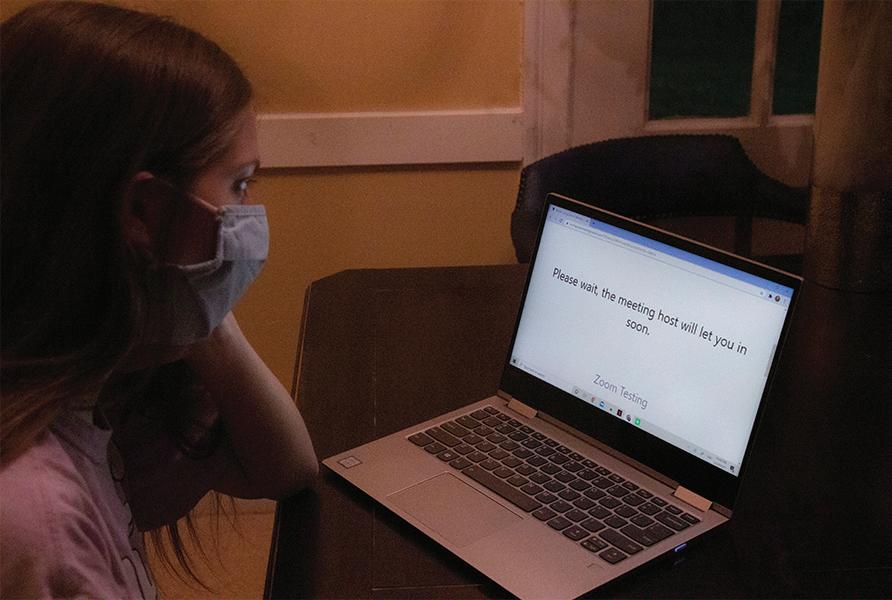
4 minute read
Sydney Sinks
From Hating This Love to Loving Myself
It took a long time, but I’m finally embracing my LGBTQ+ identity —and I’m happier than ever before. By Sydney Sinks
Advertisement
Alone in the dark room, curled up on the couch, I finally sobbed. The 2016 Tony Awards played on TV, more subdued than other years, but I couldn’t pay attention.
All I could focus on were the facts that had swirled in my head since the news broke that morning: a shooter in Orlando, a gay nightclub, 49 people dead. All day, I had pretended to be fine. I was devastated, but I couldn’t seem too sad, or else people would get suspicious. I couldn’t react to the homophobic Facebook posts on my newsfeed even though it felt like each comment was cutting me personally. I couldn’t be angry or show that I was mourning. I couldn’t even seem abnormally interested in the news story. Or else people would know. And absolutely no one could know. So I waited until everyone was asleep, and then I wept. This game of wearing masks and suppressing how I felt wasn’t new; I had been doing that for a long time.
When I realized that I noticed girls in ways my friends didn’t, I ignored that feeling. I kicked it as far away from myself as possible and hid it completely. Then I learned how to pretend like I wasn’t constantly holding my breath. 14 BURST It was so, so lonely.
But on that June night, I had this desperate, unavoidable understanding that I couldn’t live like that anymore. I listened to Lin-Manuel Miranda’s acceptance speech at the Tonys, his now-famous sonnet commemorating the people who died that day—“Love is love is love is love is love is love is love is love cannot be killed or swept aside!” And I suddenly got that love can’t be ignored or hidden, either, no matter how much I wished it could.
I may have finally acknowledged my identity that night, but actually accepting it has been an even more complicated journey. Many members of the LGBTQ+ community experience internalized homophobia. While I love my queerness, I’m still working to change how I view it. Deciding to stop ignoring who you are is one thing; overcoming the deep-seated, hateful beliefs you have about yourself is another.
As I began college and slowly let people in on my secret, I struggled to find the words. I loathed the idea of “coming out” and felt painfully awkward every time I mentioned dating or referenced an LGBTQ+ experience. When I did speak about it, I turned it into a joke and noticed defiance in my voice, like I was daring people to question me. I even wondered if I had made a mistake telling people at all. I had faked it for years; maybe I could push it down again, just go back to holding my breath and pretend to be straight for the rest of my life.
It didn’t make sense. I was certain of who I was. I loved the community that I had found. I felt more like myself than I ever had before. Why could I barely talk about it?
I genuinely didn’t understand that I was dealing with internalized homophobia until just a few months ago. I was talking to a friend and I mentioned kissing a girl. “Sorry if this is, like, disgusting,” I interrupted halfway through the story.
“How is it disgusting?” my friend asked.
And . . . I froze. Why had I said that? Almost five years after I had come to terms with it, I realized I still had it in my mind that my identity was shameful, something to apologize for. That it was disgusting.
We need to change how our culture views queerness. At best, we’re made to feel like LGBTQ+ identities are challenges to overcome, burdens that we have to figure out how to live with. At worst, we’re taught they’re a sin and
LOVE IS
something to hide. When people tell you that your feelings are bad, you believe them.
You try to hide that part of you. And then you start to hate it.
I’m working on challenging those negative beliefs. I’m not so defensive anymore, and I don’t feel like I’m constantly wearing a mask or pushing down my emotions. And I am decidedly done hiding. Instead, I talk to my LGBTQ+ friends about self-love. We look out for each other. We gossip about girls like I used to fake my way through gossiping about boys. It’s fun. More than that, it’s real. It feels like the most natural thing in the world.
Even so, I’m still waiting for that swell of self-acceptance like what I had in 2016. Maybe it won’t ever come, and I’ll keep chipping away at internalized homophobia for the rest of my life; I don’t know. But I do know that it’s a journey I’m glad to finally be on.
And sometimes I imagine talking to the 16-year-old girl who cried alone in the dark on that June night. Look at me now, I’d say to her. I’m working on it. It’s still messy, but better. I’m so much happier than I ever thought I could be.










